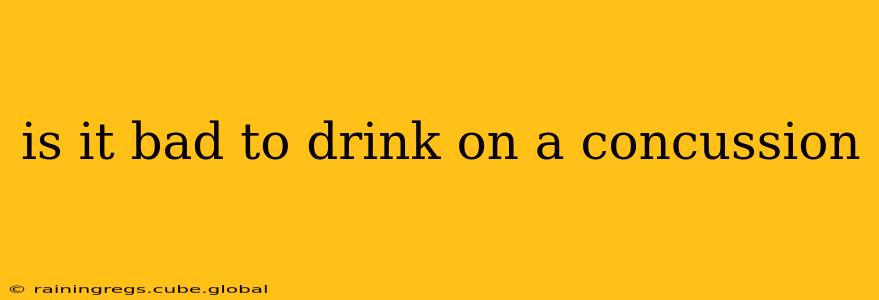A concussion, a type of traumatic brain injury (TBI), disrupts the normal function of your brain. While the initial symptoms might seem minor, the healing process is crucial, and making the right choices about your lifestyle is paramount. One of the most frequently asked questions surrounding concussion recovery is: Is it bad to drink alcohol after a concussion? The short answer is a resounding yes. Alcohol significantly hinders the healing process and can exacerbate symptoms. Let's delve deeper into why.
How Does Alcohol Affect Concussion Recovery?
Alcohol is a central nervous system depressant. This means it slows down brain activity. After a concussion, your brain is already working overtime to repair itself. Introducing alcohol further slows down this process, potentially prolonging recovery time and increasing the risk of complications.
Here's a breakdown of the negative impacts:
-
Increased Inflammation: Alcohol can increase inflammation in the brain, which is already inflamed after a concussion. This increased inflammation can prolong healing and worsen symptoms.
-
Impaired Healing: The brain needs time and proper nutrients to repair itself. Alcohol interferes with this process, preventing optimal cell regeneration and repair.
-
Exacerbated Symptoms: Many concussion symptoms, such as headaches, dizziness, nausea, and cognitive difficulties, can be significantly worsened by alcohol consumption. Even small amounts can trigger or intensify these symptoms.
-
Increased Risk of Long-Term Problems: Studies suggest a correlation between alcohol consumption after a concussion and an increased risk of long-term complications, including post-concussion syndrome (PCS). PCS encompasses a range of persistent symptoms that can significantly impact daily life.
What are the Symptoms of a Concussion?
Recognizing concussion symptoms is vital for prompt treatment and recovery. Common symptoms include:
- Headache: Often described as a dull ache or throbbing pain.
- Dizziness: Feeling lightheaded or unsteady.
- Nausea and Vomiting: Feelings of sickness and/or throwing up.
- Cognitive Difficulties: Problems with memory, concentration, and decision-making.
- Sensitivity to Light and Sound: Experiencing discomfort from bright lights or loud noises.
- Sleep Disturbances: Difficulty falling asleep, staying asleep, or experiencing restless sleep.
- Mood Changes: Irritability, anxiety, or depression.
- Blurred Vision: Difficulty focusing or seeing clearly.
How Long Should I Avoid Alcohol After a Concussion?
There's no one-size-fits-all answer to this question. The duration of alcohol abstinence depends on the severity of the concussion and the individual's recovery progress. It's crucial to consult with a doctor or healthcare professional for personalized advice. However, it's generally recommended to avoid alcohol completely until you've been cleared by a medical professional and are experiencing no symptoms. This could range from several weeks to several months.
What Should I Drink Instead of Alcohol After a Concussion?
Hydration is key during concussion recovery. Water is always the best choice. You can also opt for electrolyte drinks to replenish essential minerals lost during recovery. Avoid caffeinated beverages, as they can exacerbate symptoms for some individuals.
Can Alcohol Affect the Results of a Concussion Test?
While alcohol won't directly impact the imaging tests used to diagnose a concussion (such as a CT scan or MRI), it can affect cognitive testing, making it difficult to accurately assess the severity of the injury and track progress. It's essential to abstain from alcohol before any concussion-related assessments.
What Other Substances Should I Avoid After a Concussion?
Besides alcohol, it's wise to avoid other substances that can affect brain function, including:
- Recreational Drugs: Marijuana, cocaine, and other recreational drugs can interfere with the healing process and worsen symptoms.
- Excessive Caffeine: While moderate caffeine consumption might be okay for some, excessive amounts can worsen anxiety and sleep disturbances.
- Certain Medications: Always consult with your doctor before taking any over-the-counter or prescription medications, as some can interact negatively with concussion recovery.
Disclaimer: This information is for educational purposes only and should not be considered medical advice. Always consult with a healthcare professional for diagnosis and treatment of any medical condition, including concussions. They can provide personalized guidance based on your specific situation and medical history.
